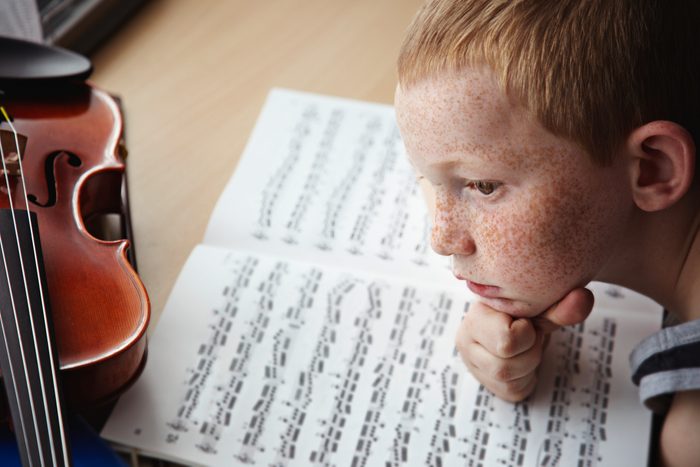
Attention-deficit hyperactivity disorder (ADHD) is a common chronic condition that affects about 9.4 percent of U.S. children, according to data from the Centers for Disease Control and Prevention (CDC), and about 4.4 percent of U.S. adults, according to the National Institute of Mental Health (NIH). This neurobehavioral disorder can sometimes have a genetic component, and it can be complex and difficult to understand, says Roseann Capanna-Hodge, PsyD, Pediatric Mental Health Expert and the founder of Dr. Roseann and Associates. “ADHD comprises a combination of issues that may include difficulty sustaining attention, hyperactivity, impulsive behavior, as well as poor executive functioning,” she says. “It can impact a child’s or an adult’s focus, learning, social, and school or work functioning.” In adults, the symptoms are not always obvious. Here are some of the most common signs of ADHD that you might be ignoring.

You have a history of ADHD symptoms
Adult ADHD always begins as childhood ADHD, says Eric Lifshitz, MD, a psychiatrist at Providence Saint John’s Health Center in Santa Monica and in private practice in Beverly Hills. Having a history of problems with concentration, focus, organization, and memory your whole life is the primary criteria in diagnosing ADHD in adults. “For adults with ADHD the issues have persisted all their lives. If the problems are a new phenomenon, then it’s not ADHD,” he explains. “There are many, many other reasons that adults can develop these issues, including depression and stress.” A trained professional can help you find the correct diagnosis to get you the best care. (These are myths about ADHD that are easy to get wrong.)

You’re already bored of a conversation … and it just started
If you have one mind-numbing conversation a day, congratulations, you’re human. But if all your conversations feel tedious—or if you’re constantly interrupting others or finishing their sentences for them to rush the conversation—then you might have adult ADHD, Dr. Lifshitz says. Another common conversational complaint of adults with ADHD: feeling like other people speak too slowly. Because the brains of those with adult ADHD are always two steps ahead, people may have a hard time listening to others and giving them time to formulate their thoughts. Find out everything you need to know about using CBD for ADHD.

You’re always 10 minutes late
If you just can’t seem to make it anywhere on time no matter what you do, you may have ADHD. And chances are you’re as irritated by your chronic lateness as everyone else is. “They’re not trying to be rude; adults with ADHD just have an extremely difficult time with time management,” Dr. Lifshitz says. “They underestimate the amount of time routine tasks, like finding their keys and shoes, will take.” (Here’s how to get organized if you have ADHD.)

You always ditch yoga class before the final relaxation pose
Rather than recharging and relaxing during breaks, “adults with ADHD often feel an inward restlessness or anxiety when not actively engaged in a task,” Dr. Lifshitz says. Children with ADHD show this as outward hyperactivity but adults learn to internalize that feeling, he explains. People with ADHD often report things like not being able to sit through a movie (especially if it’s one they didn’t choose), preferring only active hobbies, getting bored with games quickly, and getting antsy during massages. (Check out these surprising health benefits of massage.)

Your house is full of UFOs (unfinished objects)
Who hasn’t started cleaning out the dishwasher only to get sidetracked with the pile of mail on the counter? But if your whole house is filled with half-finished crafts, piles of partially read books, and baskets containing both clean and dirty laundry—and you never seem to make any progress in finishing them—then this could be a sign of adult ADHD. “People with ADHD often don’t see the end result, so simply starting a task in non-preferred area can be daunting because they don’t see the big picture,” says Capanna-Hodge. “Sticking with a task like cleaning your closet or finishing a project is hard because the brain of an individual with ADHD is understimulated.” (If you also get panic attacks, you might be surprised to know they can actually be a symptom of ADHD.)

You’re prone to making lots of little mistakes
As children with ADHD grow up they often develop coping behaviors to manage their deficits in the adult world. But these can easily fall apart when you take more responsibility, like getting a promotion or going to graduate school, Dr. Lifshitz says. This often manifests as poor performance reviews, shortcut taking, and making myriad little mistakes even though you know that you know better. (Read one woman’s story of being diagnosed with adult ADHD at age 47.)

You can be forgetful
We all forget things here and there, especially when our schedules are jam-packed with work, household responsibilities, and social commitments, but if you are experiencing forgetfulness frequently, it may be a sign of ADHD. “You may be there and ‘appear to be listening or engaged,’ but your mind isn’t really alerting to the task at hand, so you forget things you need to recall,” says Capanna-Hodge. “Missing important directions and forgetting where you put things are common issues that result and really interfere with a child or person with ADHD’s life.”

You’re always changing the radio or TV channel
“People with ADHD need high levels of stimulation,” Lifshitz says. This could translate to constantly changing channels, checking their phones, whistling or humming, or fidgeting. They may also prefer to be in places with lots of light, noise, and people. (These home remedies for ADHD are worth a try.)

You get sucked into online gambling or day trading
Adults with ADHD also seek out high levels of stimulation in their jobs and hobbies. Since they get easily distracted and have a hard time performing during lulls in activity, they turn to activities that provide immediate gratification. “What people don’t realize is that hyper focus is one of the symptoms of ADHD,” explains Capanna-Hodge. Unfortunately these high-reward activities can also be high risk, like gambling.

Your three least favorite words are ‘moment of silence’
Long periods of quiet, especially during conversations or activities, feel supremely uncomfortable to adults with ADHD, Dr. Lifshitz explains. This may lead them to interrupt, sing, talk to themselves, tap the table, or otherwise make noise to fill the quiet—activities almost guaranteed to irritate those around them. (Here are silent signs of high-functioning anxiety.)

You’re depressed
Dr. Lifshitz says he often sees ADHD present in adults as depression and low self-esteem. “ADHD affects not just work and school but also their social life,” he explains. “Because of their distractibility and irritability, adults with ADHD have a harder time forming connections with others.” Plus, over time, the constant accumulation of difficulties socially and in school can lead to lifelong insecurity. “Behavioral therapies and antidepressant medication may also help decrease associated anxiety and/or depression while improving attention,” adds David A. Merrill, MD, PhD, psychiatrist at Pacific Neuroscience Institute in Santa Monica, California. (These are warning signs of depression you might be overlooking.)

You feel like a failure at life
It’s normal to feel bad when you fall short of a goal but if you always feel like you’re falling behind no matter how hard you try, this may be a sign of adult ADHD. “Patients often have a chronic sense of not living up to their potential and have difficulty accomplishing their goals,” Dr. Lifshitz explains. Worse, this can be most acute in people who are naturally very intelligent and high achievers. They know what they’re capable of and can see that they have to put in a lot more effort than everyone else, just to get the same results. But rest assured, he adds, ADHD does not say anything about your intelligence or talent.
Next up: Here are the tips on finding the best doctors.